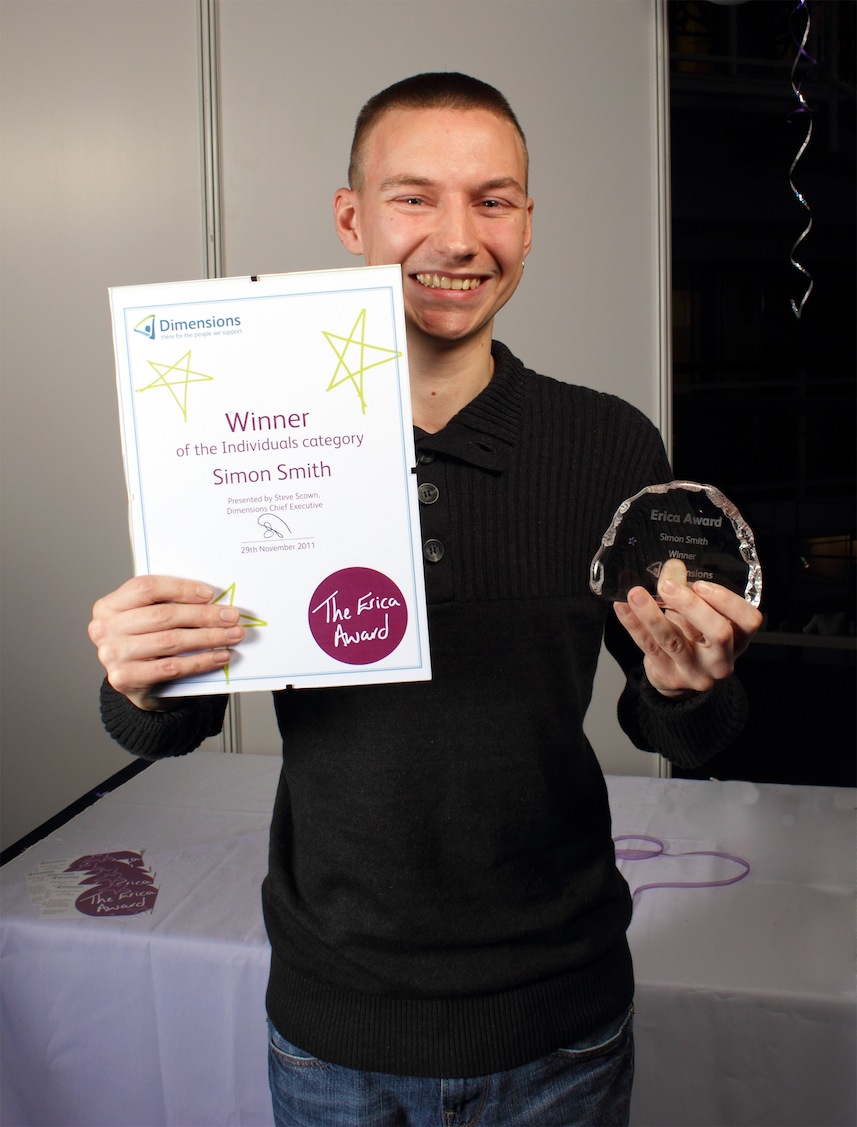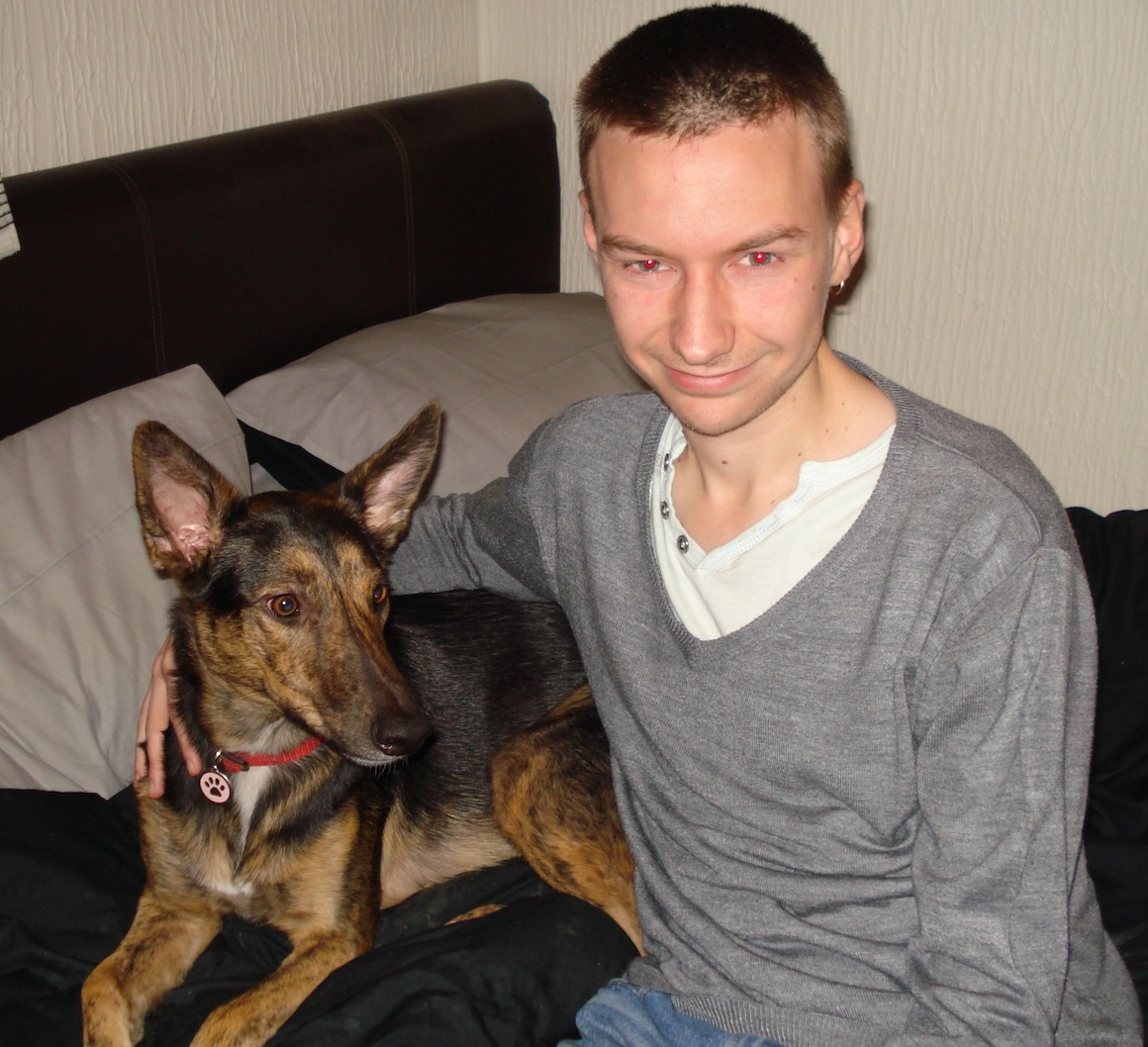
By Simon Smith
My mum and dad realised something was different about me when I was about two to three-years-old, because I played differently to other children. I didn’t engage and interact with others. I didn’t cuddle or give eye contact. I had difficulties with speech and hated change.
I started realising from the age of 14-15 that people were treating me differently and this is when I first realised that I was different. At first I felt kind of annoyed about and wondered why I was getting all the attention. I then asked my mother what was going on with me. She told me I was different to the other kids. First of all she told me all the good things about me; such as my brilliant memory and amazing empathy with animals. She also explained why I was having difficulties in certain areas such as making friends and interacting .
I was diagnosed when I was five. I went to a mainstream school with a statement of special educational needs. At school had I one-to-one support, speech and language therapy. I also attended a behaviour unit and later on had support from the Autistic Spectrum Condition Support Services which came into my school to give advice and support.
Being autistic means I am someone who feels and sees the world in more detail then people without autism. I have heightened senses such as sight, taste, touch ,smell and hearing . This means that I can find things incredibly annoying that wouldn’t bother other people or in some cases it means that I find things more interesting.
Looking back, it was when I started school things became a huge challenge. People often thought I was a trouble-maker (mostly the teachers due to their lack of understanding of my autism and my behaviours). Other students often found me very strange and in some cases would be cruel; bullying me because I was different. Being treated badly by people who didn’t understand me made me very negative about my ambitions and myself which still affects me today. The other thing that makes me different is my obsessions, but I’ve used to help guide me through tough times and they have also created opportunities and brought me success, like the award.
At the moment I have no support except from my parents because the local authority says I don’t meet the criteria.
At the end of last year, I won an Erica Award from learning disability support organisation Dimensions for the talks I do about autism. The annual awards celebrate people with autism who help others. It’s nice to feel appreciated for the hard work I do. I’m very honoured by it and I still can’t believe I won it.

My talks came about when my mum was working with pre-school children with autism so when one day she asked for some advice on how to support a child, it made me think back to when I was a child of the same age. I looked back on what made things hard for me and told my mum what it was like from my perceptive. I told mum what it was like for me being autistic and how it affected my everyday life.
My mum said she learnt so much more about autism from me that day that she thought it would be really helpful for other parents. She arranged for me to do a talk to the parents of other children like me.
My talks cover a lot of areas including sensory issues, how my brain works, how I learn to communicate and socialise, my repetition,imitation, obsessions and my behaviour issues. I also offer general advice and strategies to help support people and the opportunity to ask questions. I give out evaluation sheets so people can comment on my talk if they want me to add or change anything.
The feedback is amazing. One parent has written: “I got home yesterday and saw my son from a completely different perspective, thanks to your insight and inside knowledge of autism” and a professional commented: “Simon’s talk was super every trainee teacher/nursery/pre-school worker in the country should meet Simon and hear his experiences. I learnt more in one hour about autism that 20 years as a teacher have ever done. I feel very uplifted and look forward to sharing/reflecting to my colleagues.”
I feel happy that I am going to try and give advice which might help people that I’m talking too. Afterwards I feel mentally tired as it takes a lot out of me and I need feedback from people because I find it hard to tell how well I’ve done.
The feedback from my first talk made me want to help more parents, so my mum asked Amaze – an advice service for parents of children with special needs – if they could help. Through Amaze I did a talk to 27 parents. These parents requested that I spoke to the professionals that they have to deal with because they felt that they were often not listened to. So my mum arranged for me to do talks for professionals such as respite services, PRESENS (Pre-School SEN Services) and two local special schools. I do talks for professional services and parent support groups and have done two workshops at a conference.
It makes me feel uplifted to know how much people appreciate my talks, to be told how much of a difference I am making in helping them to understand more about autism from a personal perspective and this encourages me to do more. I believe that information about autism is better when it comes from someone who is autistic.
My plan is to do more talks and to encourage other people with autism to do them with me and to continue my mentoring. My biggest aim would be to form a group of people with autism who would be confident to be able to attend any meeting regarding anything that might affect people who have autism because I feel it’s very important to have individuals with the problems to speak out and have a voice.
I would like to make councils and governments have someone with the learning disabilities or someone with autism actually on board, attending meetings and giving their own personal input which I think we can all benefit from. If I could get the government to do one thing it would be to consult more with the people that experience the conditions that they are making policies about to get their points of view.
* Simon Smith, 23, from Brighton, won the 2011 Erica Award because of his outstanding contribution to helping others understand what it is like to experience autism.

Hi Kim/Simon
Claire Fletcher from Dimensions mentioned the wonderful work that Simon is doing. I was hoping we could have a chat to see if you would like to get involved in The Autism Show 2012. My telephone number is 0208 882 0629.
Best wishes
Nargis